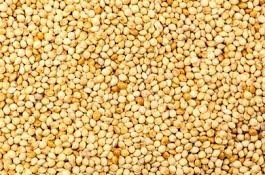For the first few months of life, most new mothers don’t have to worry about what to feed their babies. Nature has made provision for an always available, highly nutritious meal for newborns in the form of breast milk.

In fact, we advise all new mums to breastfeed exclusively for 6 months. However, after that, the question of which solid food supplies your baby with the best nutrients may spring up.
As usual, we’re here to help out.
Firstly, What’s Guinea Corn?
Guinea corn, also known as Sorghum has been a common choice for African mothers for a very long time. It is also becoming increasingly popular in all parts of the world. This popularity isn’t strange because guinea corn is a highly nutritious cereal. It is not only highly beneficial for adults, but it is also especially good for babies.

If you are a new mother searching for the best weaning foods, you have come to the right place.
Nutritional Content Of Guinea Corn
Guinea corn is a highly nutritious grain and a natural energy inducer. It is rich in protein, cellulose, and other micronutrients such as:
- magnesium
- iron
- vitamin-B
- copper
- calcium
- potassium
Guinea corn is the real superfood you need to fulfill all your babys’ nutritional requirements for healthy growth.
Health Benefits Of Guinea Corn:
1. Weight Booster
African mothers take pride in their newborns growing and putting on healthy weight. Guinea corn is a superfood with high-calorie content to support weight gain. Therefore, it’s no surprise that many Nigerian mums choose to feed their babies guinea corn once they stop breastfeeding.

Furthermore, it’s necessary for a child to be at a healthy weight for proper growth and development to occur. Babies who are underweight usually have problems with physical and mental development.
If your baby is having issues putting on weight, guinea corn will be very helpful. This superfood is not only packed with nutrients but is also high in calories that will help your baby gain weight easily.
2. Aids Digestion
The process of transitioning from consuming breast milk to eating solid foods is a gradual one. Your baby’s digestive system may take some time to adjust to the new diet and you may have to deal with some bowel inconsistencies. However, guinea corn can be easily digested by your baby’s system. In fact, it will even help improve your baby’s digestive system and get rid of common bowel problems.
3. Anti-carcinogenic Properties
Medical studies show that guinea corn can prevent cancer. This amazing grain is rich in phenolic compounds which prevent the growth of cancer cells in the colon and breast.
Still doubting this amazing grain?
Just hold on.
How to Use Guinea Corn As Baby Food
Guinea corn can be processed and eaten in different ways. Some of them include:
- Brown Pap
This is one of the most common baby foods used to wean babies in Nigeria. It is like our very own English version of custard. This highly nutritious meal is made from a combination of corn, millet, and guinea corn. It provides your baby with the right amounts of carbohydrates, proteins, and vitamins necessary for growth.

In addition, pap can even be fortified with milk, fruit purees, soya beans, groundnuts, or even crayfish, you have a balanced diet!
- Kunu Geida
This is also another local baby food. Kunu Geida is made from guinea corn and dried nuts. It is also highly nutritious and contains sufficient amounts of protein, fats, and carbohydrates needed for your child’s growth. Feeding your child Kunu geida regularly will help him grow faster and gain weight.
In addition to this, you can also process Guinea corn into flour for baking bread, pancakes, and porridge.
In Conclusion
We advise that you breastfeed your baby exclusively for at least the first 6 months of life before you consider introducing solid foods.
Guinea corn is one of the best foods you could introduce to your child first.
Finally, It is easily digestible and highly nutritious. You should try it!
REFERENCES
- Chioma 2020, 7-Steps to Making Baby’s Brown Pap, Mummy’s Yum, Viewed on August 15, 2020, https://mummysyum.com/7-steps-to-making-babys-brown-pap/.
- 2) Nago, Mathurin Coffi; Hounhouigan, Joseph D.; Akissoe, Noël; Zanou, Elisabeth; Mestres, Christian (June 1998). “Characterization of the Beninese traditional ogi, a fermented maize slurry: physicochemical and microbiological aspects”. International Journal of Food Science & Technology. 33 (3): 307–315. doi:10.1046/j.1365-2621.1998.00169.x.
- Chukwu, Ogbonnaya & Abubakar, I.. (2011). Determination of Some Physicochemical Properties of Guinea Corn (Sorghum vulgare). Journal of Innovative Research in Engineering and Science. 2. 62-66.
- Eifediyi, Kevin. (2015). Studies on the growth and yield response of guinea corn (Sorghum bicolor) to organomineral fertilizer application in Ilorin North Central Nigeria. Nigerian Journal of Applied Science. Volume 33.
- Shutterstock

